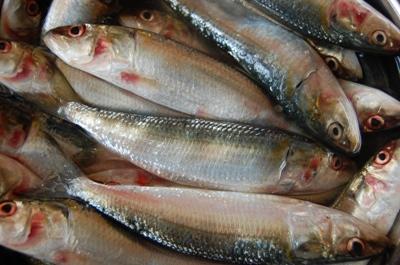The Indian oil sardine stock along the Kerala coasts is likely to suffer a major setback during the coming years, according to the Central Marine Fisheries Research Institute (CMFRI).
The scientists at the CMFRI are of the view that as the El Nino is gaining momentum, sardine stock in Kerala waters may be severely affected leading to a substantial drop in catch.
Though there was a marginal increase in the production of sardine in 2017 after a record-low harvest in 2016, once again the El Nino, that began to gain pace before the sardine stock revived to its normal level from an earlier depletion, may spell disaster on Kerala’s fisheries sector with a dwindling catch of sardine, scientists said.
After studying the data of fluctuations in the production of the oil sardine for last 60 years, the scientists at the Pelagic Fisheries Division of the CMFRI concluded that El Nino is the major factor that caused depletion of oil sardine stock.
“Although a record catch of nearly four lakh tons of oil sardine was registered in the State in 2012, a gradual decrease was recorded in the landings during the following years owing to the development of El Nino”, said Dr EM Abdussamad, Principal Scientist at CMFRI. A sharp decline to about 46,000 tons was experienced in 2016 following a strong El Nino year in 2015. With the intensity of the El Nino decreased, the sardine catch registered an increase in 2017.
“The Climate Prediction Centre of the National Oceanic and Atmospheric Administration (NOAA), which is an international agency focusing on the conditions of the oceans, warned in December last year (2018) that El Nino is expected to strengthen during the coming seasons. The World Meteorological Organization (WMO) and Indian Meteorological Department (IMD) also stated that 2018 was an evolving El Nino year and that 2019 may be warmer due to El Nino and global warming”, he said adding that with the El Nino getting strengthened the catch of sardine from the Kerala coasts might be decreased. Last year (2018) also saw a stagnation in the catch of sardine from the state compared to the previous year, he said.
He said that the oil sardine in Kerala coast suffered growth retardation and spawning failure in 2015 and 2016, thanks to El Nino. “What is more alarming now is that El Nino has struck again even before the resource recovered from biological stress like spawning failure in full scale which is likely to cause further troubles to the sardine stock in Kerala”, he said.
“Indian oil sardine is a sensitive pelagic fish whose biological cycle will easily be upset even due to slight differences in ocean ecosystem. The impact of El Nino is more evident along Kerala coasts than other areas of the country. Hence, the fluctuation in oil sardine catch is always high along the south west coast”, he added.
“El Nino has been proved to be seriously influencing the growth and reproduction of oil sardine resources in this coast. In addition, it has been noted that sardine used to migrate from Kerala to other coasts during El Nino years”, Dr Abdussamad said.
A book with detailed analysis and latest findings about oil sardine prepared by the CMFRI will be released soon.
Image Credit: Wikipedia.org




















